NordVPN, Surfshark, ExpressVPN and Windscribe confirm they are willing to engage with UK government
Go to Source
Author: Danielle
‘It’s time to demand AI that is safe by design’: What AI experts think will matter most in 2026
The hopes, expectations, and AI trends to look out for over the next year, according to the experts.
Go to Source
PELADN WO4 review: When a mini PC gets the fundamentals right
At a glance
Expert’s Rating
Pros
- Excellent performance thanks to Ryzen 5 7640HS and Radeon 760M graphics
- Decent SSD transfer rates thanks to CT1000P3 from Crucial/Micron
- Magnetic cover enables lightning-fast hardware upgrades
- Quiet cooling system even under sustained load
- Wide range of connectivity options including USB-C and Wi-Fi 6E
Cons
- The case surface is scratch-resistant, but attracts dust
Our Verdict
The PELADN WO4 is recommended for users who are looking for a powerful yet maintenance-friendly system. The mini PC stands out from the competition thanks to its magnetic cover and the use of brand-name components. Whether as a compact workstation, AI accelerator, or for casual gaming, the combination of Ryzen 5 7640HS and 32GB DDR5 RAM offers reserves for the next few years. A well-designed piece of technology without the usual compromises in terms of upgradeability.
Price when reviewed
This value will show the geolocated pricing text for product undefined
Best Pricing Today
Best Prices Today: PELADN WO4

PELADN is another mini PC manufacturer from the Far East. At the time of testing, 26 models with Intel and AMD processors were listed in its own EU shop, although not all of them are available.
Some of PELADN’s minis are also available on Amazon, including the WO4 tested here with AMD Ryzen 7640HS and Radeon 760M graphics. We put this attractively priced model through its paces.
Design and workmanship
My first impression of the PELADN WO4 was that it’s cool and high-quality. The metal alloy casing not only looks sturdy, but also supports heat dissipation. The scratch-resistant surface feels silky and resists fingerprints surprisingly well. Compared to high-gloss models such as the Acemagic M1, this is a clear advantage in everyday use.
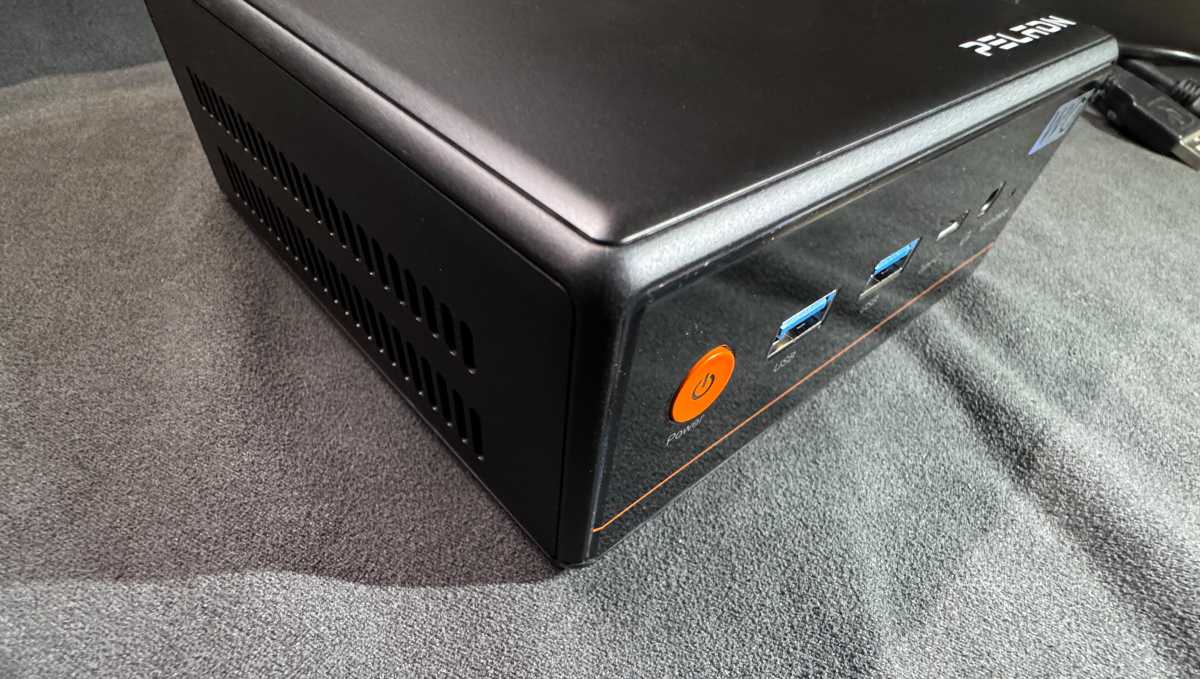
Christoph Hoffmann
There has been an exciting trend in the world of ultra-compact computers for several months now: Devices are not only becoming faster, but also easier to maintain. While competitors such as the Geekom A7 Max or the Acemagic M1 rely on a closed unibody design, which requires laboriously removing the rubber feet and loosening screws for upgrades, the PELADN WO4 takes a much more user-friendly approach.
Similar to the Sapphire Edge AI 370, the cover on the top of the case can be lifted without tools, giving easy access to the slots for two RAM modules and two NVMe SSDs. Despite this flexibility, the cover sits rock-solid when closed, with nothing rattling or feeling unstable.
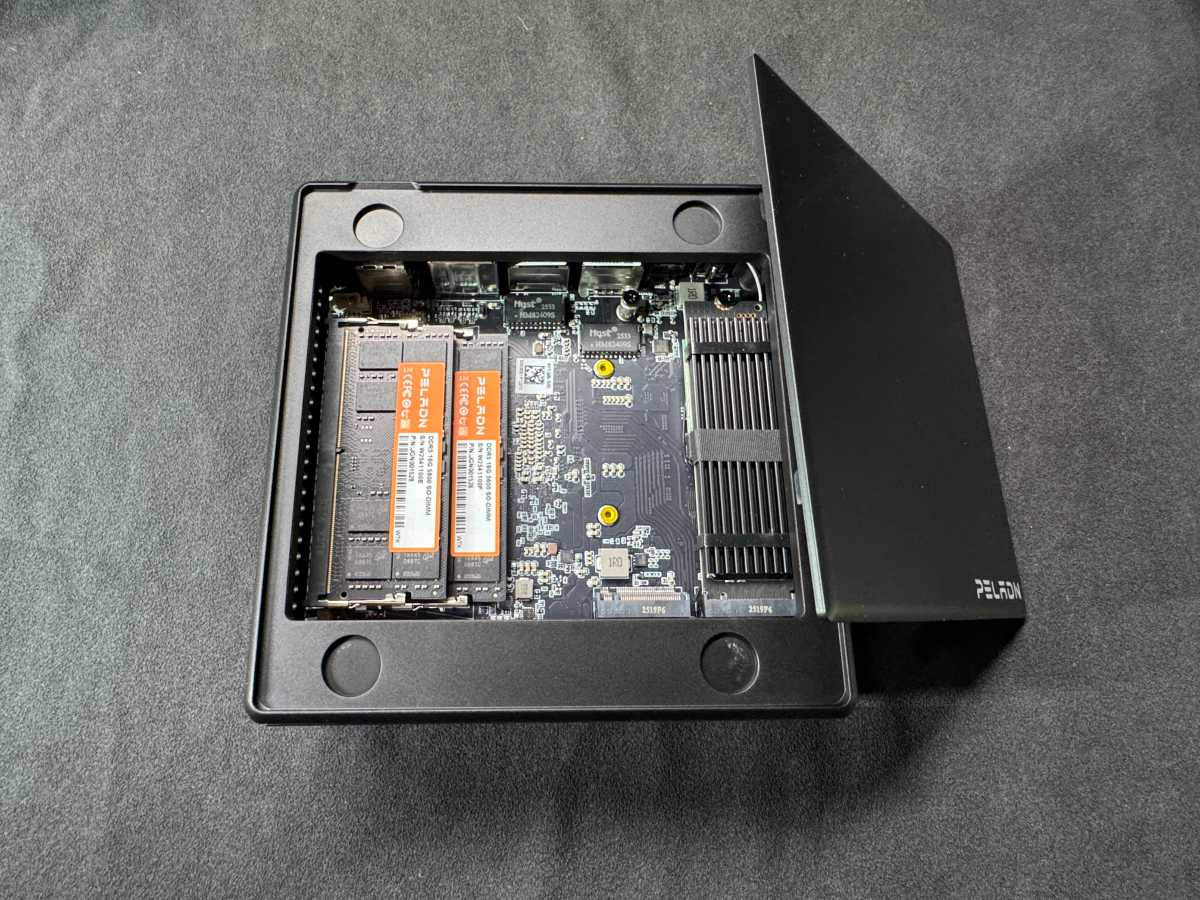
Christoph Hoffmann
With dimensions of approximately 5 × 5 × 2 inches (width × depth × height) and a weight of around 1.21 pounds, the WO4 is significantly more compact than comparable devices such as the Geekom A7 Max or the Miniforums AI X1 Pro. This allows it to be flexibly placed on a desk, in the living room, or at a home office workstation. The included VESA mount also allows for space-saving attachment directly to the back of the monitor.
The cooling system of the PELADN WO4, called “FrostCool,” relies on a sophisticated two-fan concept, setting it apart from the often undersized competition. The main fan efficiently transports the waste heat from the Ryzen 5 7640HS to the outside via large copper heat pipes. An additional system fan ensures a constant air flow over the DDR5 RAM and the Crucial SSD installed in the test device.
This active cooling of the memory components is a decisive advantage, as it effectively prevents the thermal throttling that is feared with NVMe SSDs during long write operations. Thanks to the solid construction of the heatsink and an intelligent fan curve, the mini PC remains virtually inaudible in office use. Under full load, it emits only a sonorous, unobtrusive hum instead of high-frequency whistling.
Another plus point is its ease of maintenance: The magnetic case cover allows tool-free access to the cooling system. This makes regular cleaning of the fan blades from dust a breeze and ensures long-term system stability.
Features
The AMD Ryzen 5 7640HS forms the heart of a new generation of mini PCs like the PELADN WO4 that focus on efficiency and AI acceleration. The six-core processor is based on modern 4nm manufacturing and Zen 4 architecture (“Phoenix”).
In terms of performance, it is on par with former high-end chips such as the Ryzen 9 5900HX or the Intel Core i5-12500H. However, it significantly outperforms them in terms of energy efficiency and single-core performance.
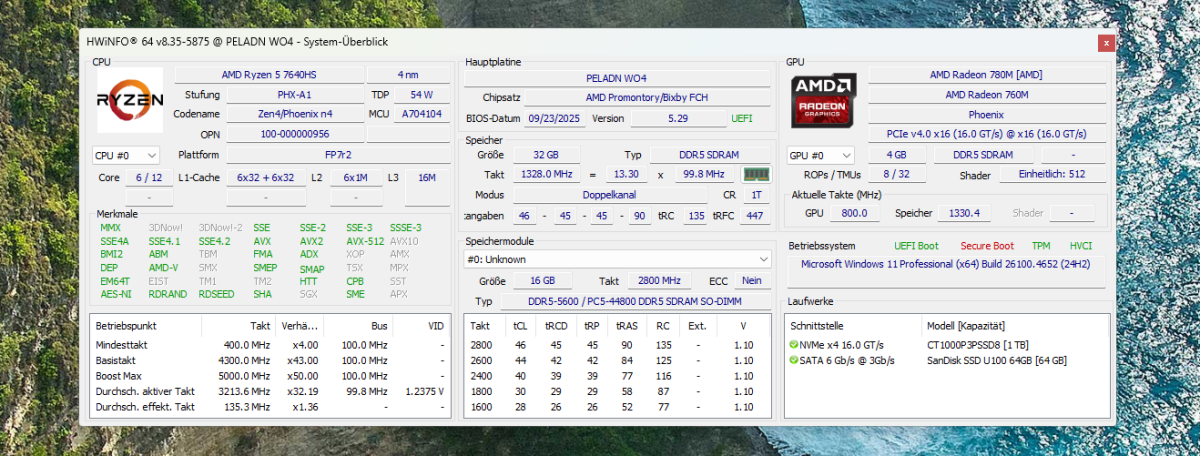
Christoph Hoffmann
Compared to the Zen 3 models (such as the Ryzen 5 5600H or 5800H) found in many cheaper mini PCs, the 7640HS benefits from double-digit IPC growth and support for AVX-512. This makes it powerful enough for modern software workloads and future-proof.
Although its bigger brother, the Ryzen 7 7840HS, offers two more cores, the 7640HS is almost on par in terms of single-thread performance, which is crucial for everyday use, and often outperforms competing models in the Intel Core i5-13500H series in graphics benchmarks.
A unique selling point in this price range is the integrated Ryzen AI Engine (NPU), which offers dedicated hardware acceleration for AI tasks. This feature is completely absent in older mini PC generations or the pure office CPUs of the Intel T series.
A look under the cover shows that PELADN makes no compromises when it comes to components. While many manufacturers are moving towards soldering the RAM in place for space reasons — a criticism often levelled at ultra-slim models — the WO4 offers two classic SODIMM slots. It comes with 32GB of DDR5-5600 RAM installed at the factory, spread across two 16GB modules.
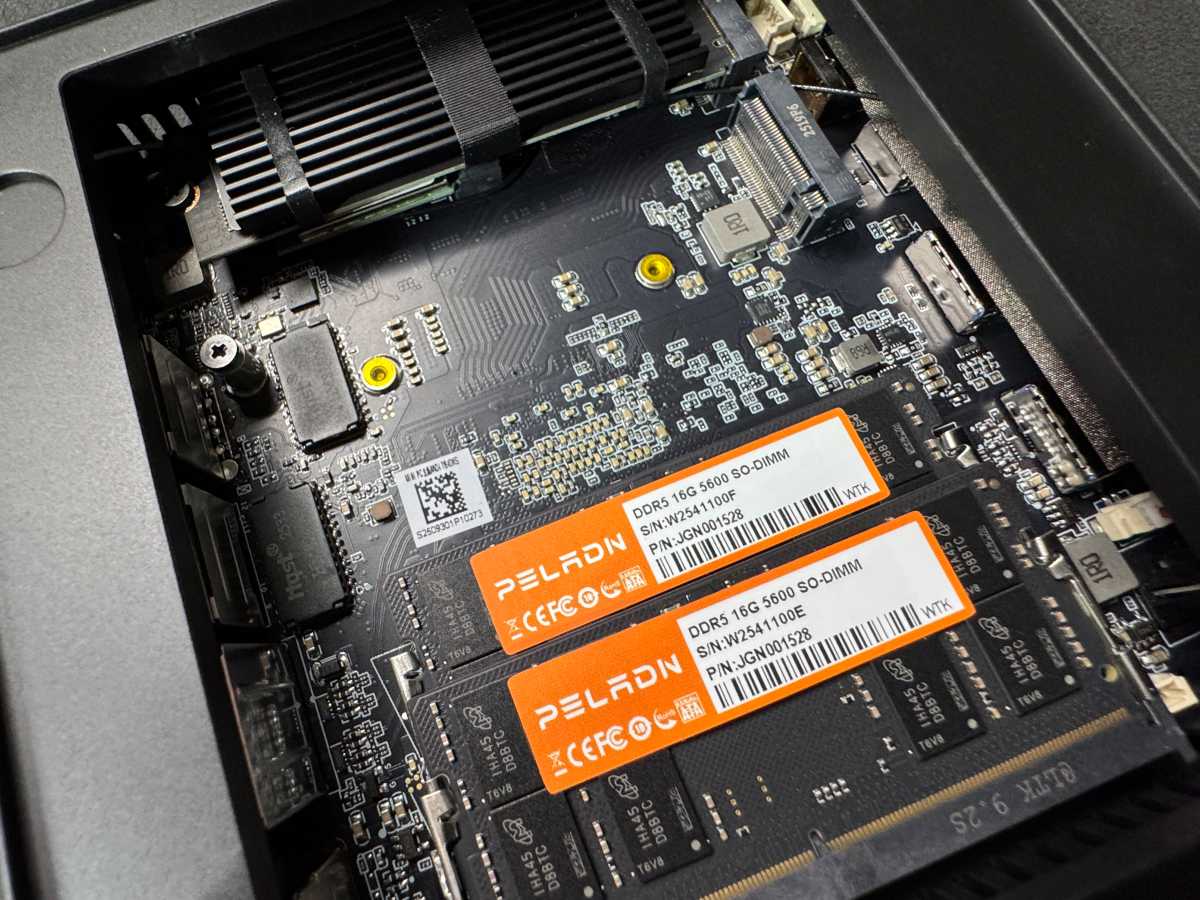
Christoph Hoffmann
No corners were cut when it came to the SSD: Thanks to its PCIe 4.0 connection, the built-in 1TB Crucial P3 delivers transfer rates that allow the system to boot in seconds — more details on this below. The variety of connections on the case makes some full-grown desktop workstations look outdated. Particularly noteworthy are Wi-Fi 6E and Bluetooth 5.2, which ensure an extremely stable wireless connection.
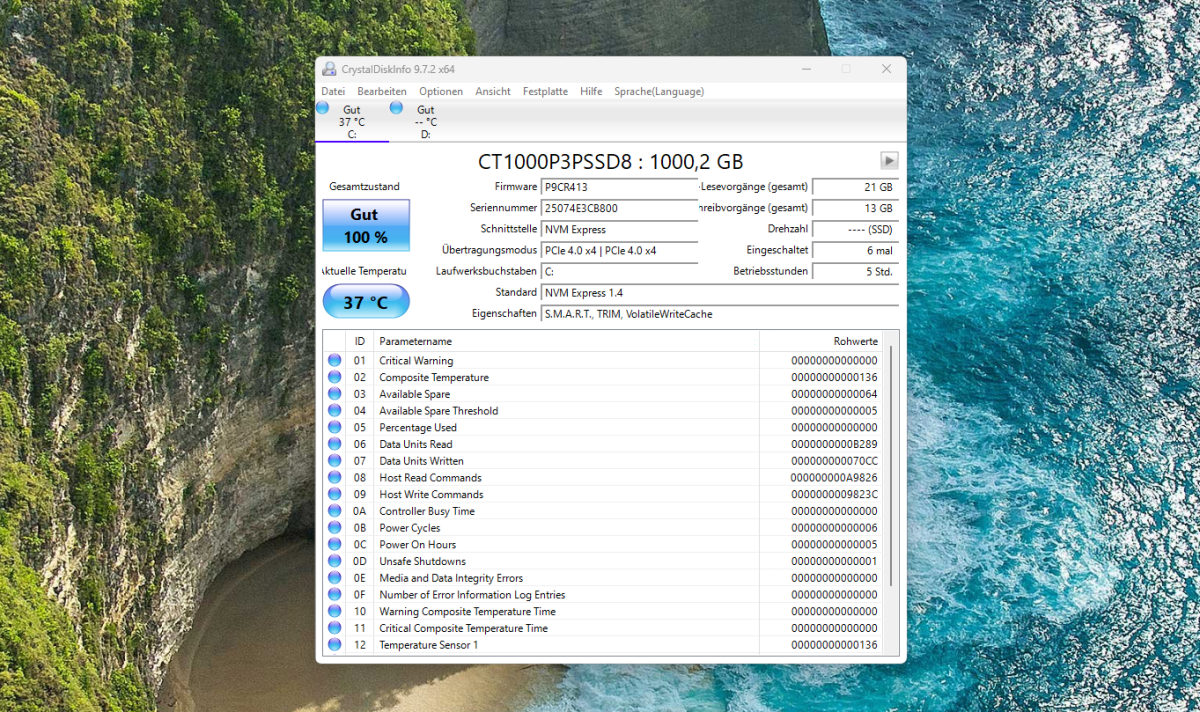
Christoph Hoffmann
The front of the PELADN WO4 has a modern and user-friendly design. In addition to the illuminated power button, there are two USB 3.2 Gen 2 ports that enable data rates of up to 10Gbit/s. This makes them ideal for quickly connecting external SSDs or high-performance USB sticks. This setup is complemented by a combined 3.5mm jack connection for headsets. This is particularly beneficial for users who have their PC on their desk and do not want to reach behind the device to connect audio accessories.
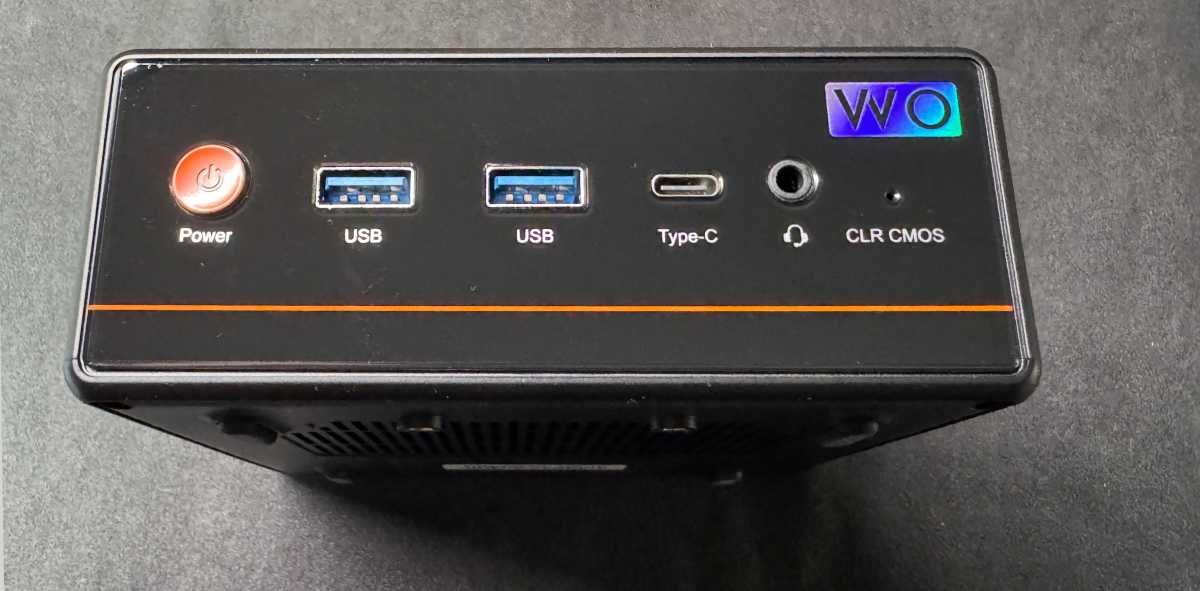
Christoph Hoffmann
The highlight on the front is the full-featured USB-C port. This not only supports fast data transfer, but also DisplayPort Alt Mode. Depending on the configuration, this allows a third monitor to be controlled. The result is a high degree of flexibility in everyday work, as frequently changed peripheral devices are immediately accessible.
The rear of the mini PC is designed for continuous stationary operation and offers numerous connection options. An HDMI and a DisplayPort connection dominate here. Together with the USB-C port on the front, they enable a triple-monitor setup with up to 4K resolution at high refresh rates.
A 2.5G Ethernet port is available for integration into the home network, offering significantly higher transfer speeds than the conventional Gigabit standard, which is also available. The two LAN ports are an advantage for users who work with a NAS or want to move large amounts of data over the network.
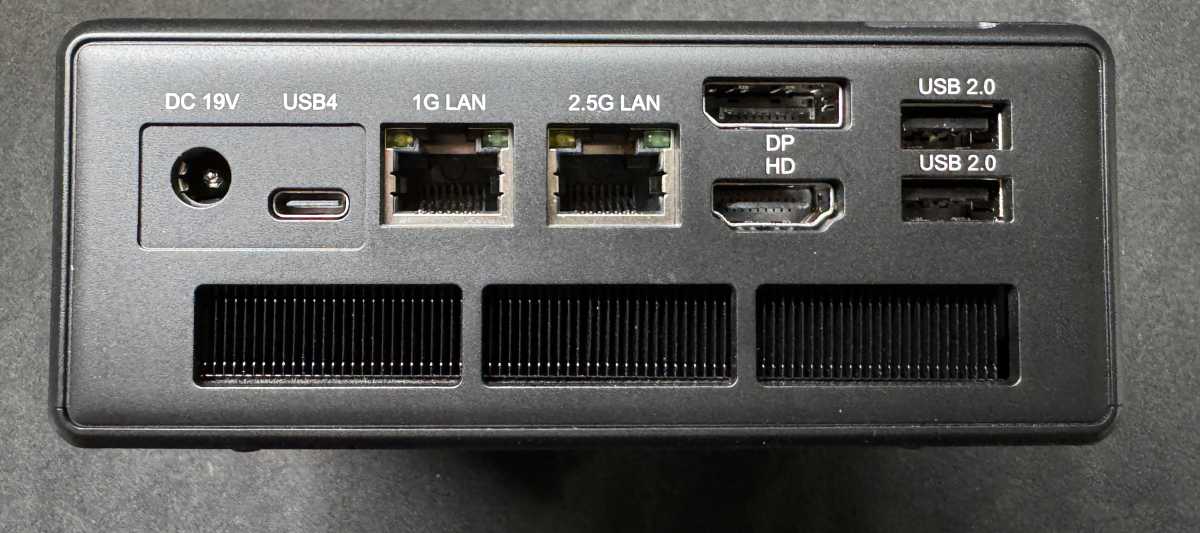
Christoph Hoffmann
There are also two additional USB-A ports on the back, which are suitable for connecting peripheral devices such as mice, keyboards, or printers.
Directly below the ports are the generous air vents of the cooling system. They are positioned so that the warm air is directed away from the user. The rear panel is rounded off by the power input for the external power supply. The arrangement of the sockets has been chosen so that the plugs do not block each other, even when all ports are fully occupied.
Windows 11 Pro is pre-installed
The PELADN WO4 comes with Windows 11 Pro pre-installed. With an active internet connection, the operating system is quickly activated and set up. Windows 11 is factory-set to 24H2 Build 26100 with a release date of 1 October 2024.
After setup, we updated the system to the latest version using the update function. We then installed the AMD drivers for the chipset and the Radeon graphics card.
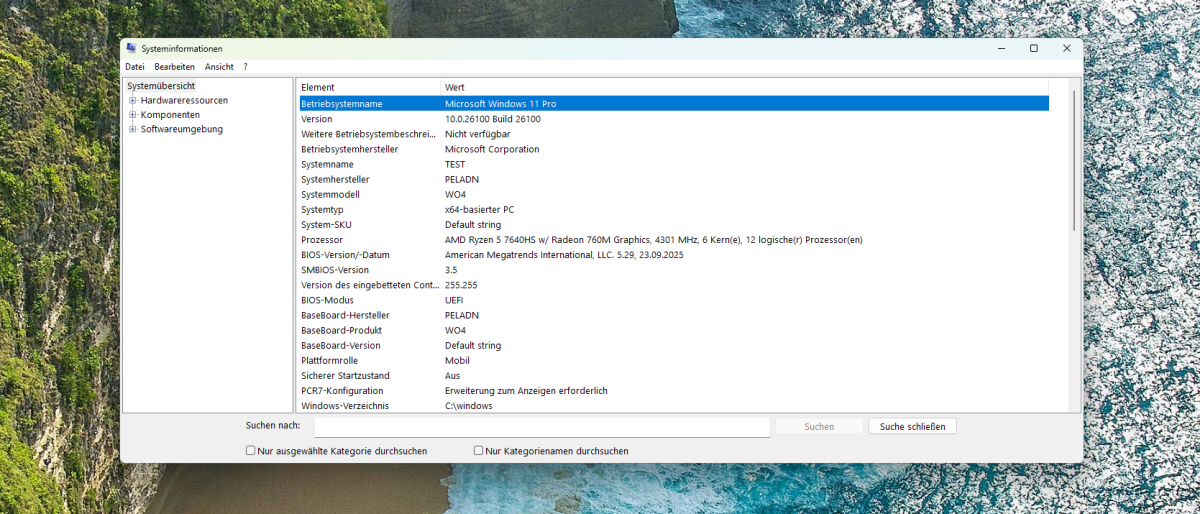
Christoph Hoffmann
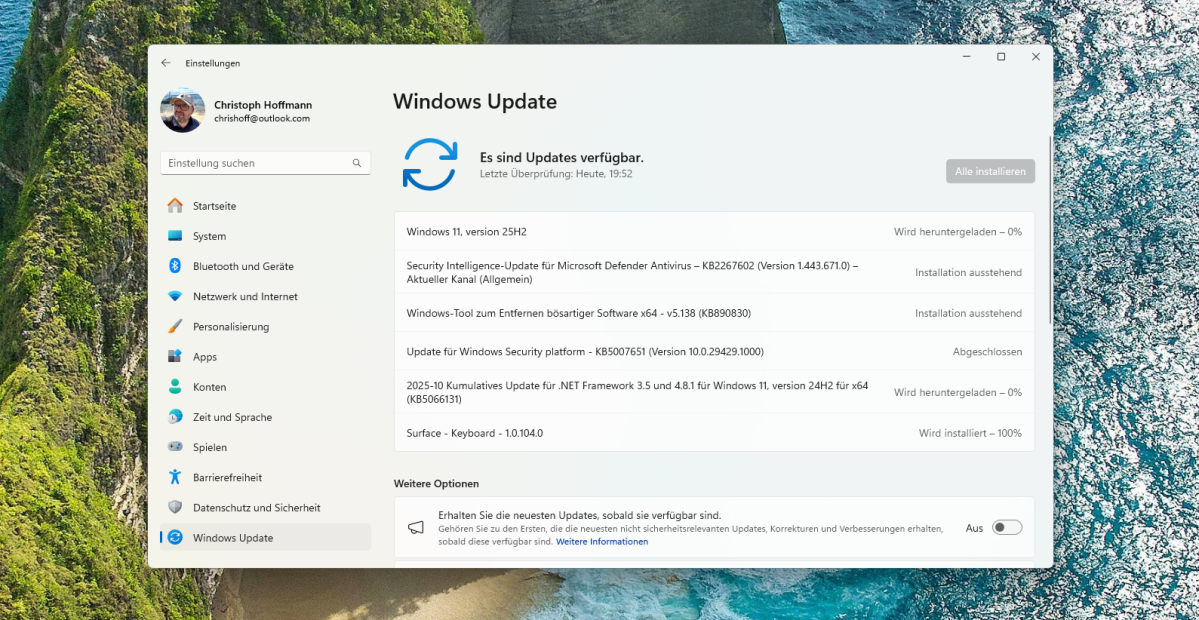
Christoph Hoffmann
Although we do not evaluate Windows 11 Pro separately, the interaction between the operating system and hardware is an important aspect of the WO4. The AMD Ryzen 5 7640HS harmonizes well with the current Windows 11 build thanks to its modern platform. The integrated AI unit creates a future-proof basis for functions that are already used selectively by Windows 11 and are likely to become even more important in the future.
Computing power
With the AMD Ryzen 5 7640HS, the PELADN WO4 positions itself as a powerful representative of the current mini PC upper class. In benchmarks, it achieves a balanced ratio of CPU performance, graphics performance and memory throughput.
The processor is based on the Zen 4 architecture of the Phoenix generation and integrates the Radeon 760M graphics unit. This puts the WO4 in the same performance range as compact high-performance systems.
Compared to the newer Zen 5 platforms, such as those used in the Sapphire Edge AI 370, the WO4 is based on a mature and established architecture. The integrated Ryzen AI unit provides fundamental support for AI applications.
Combined with 32GB of DDR5 RAM and a fast PCIe 4.0 SSD, the result is a system that can reliably handle not only classic office and productivity tasks, but also demanding multitasking and computationally intensive workloads.
In the PCMark benchmark test, we determined a desktop computing power of 7,158 points. The software processes everyday tasks one after the other, thus delivering realistic values.
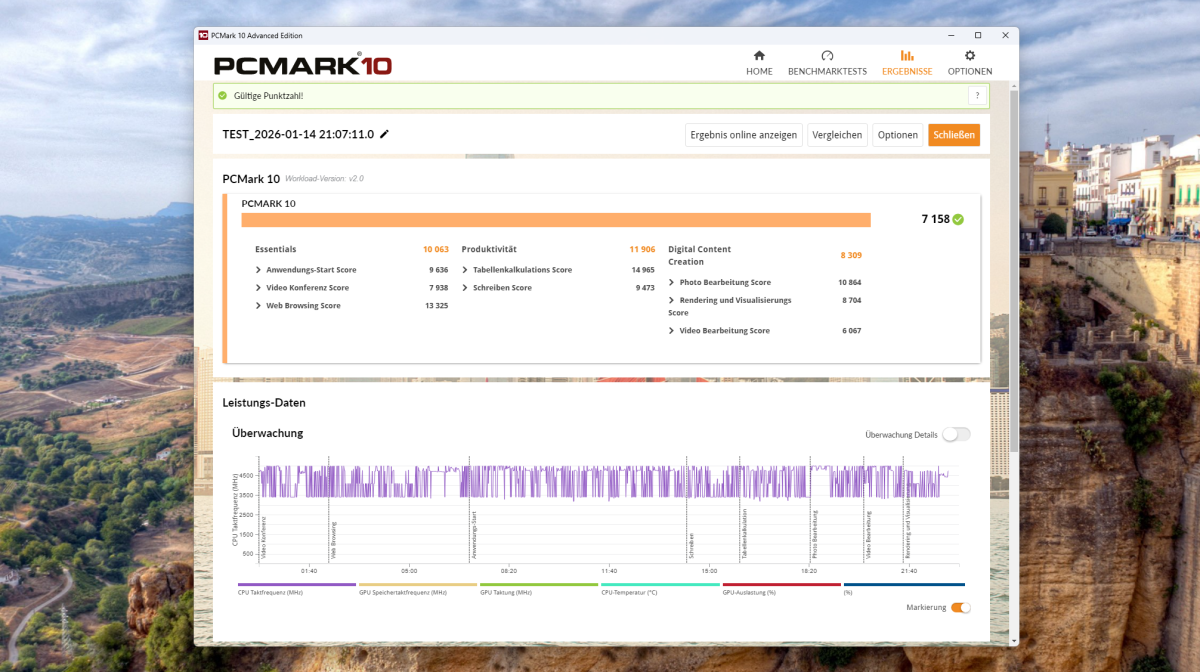
Christoph Hoffmann
The benchmark results in the Essentials (10,063 points) and Productivity (11,906 points) sub-areas show that everyday tasks, office applications, and multitasking run smoothly on the WO4. However, the score in the Content Creation area is weaker at 8,309 points.
This puts the mini PC significantly behind systems based on the AMD Ryzen AI 9 HX 370 and about 2,200 points behind the Geekom IT15 with Intel Core Ultra 9. This reflects the clearly higher performance of this platform in computationally and media-intensive scenarios.
In the 3DMark CPU test, the WO4 demonstrates balanced performance. With 5,949 points in the multithread run and 974 points in the single-thread test, the result is on par with a mobile Ryzen 9 8945HS.
In a direct market comparison, however, the WO4 lags around 20 percent behind systems with AMD Ryzen AI 9 HX 370. At the same time, scaling across multiple threads shows that computationally intensive tasks and parallel AI workloads are performed quickly.
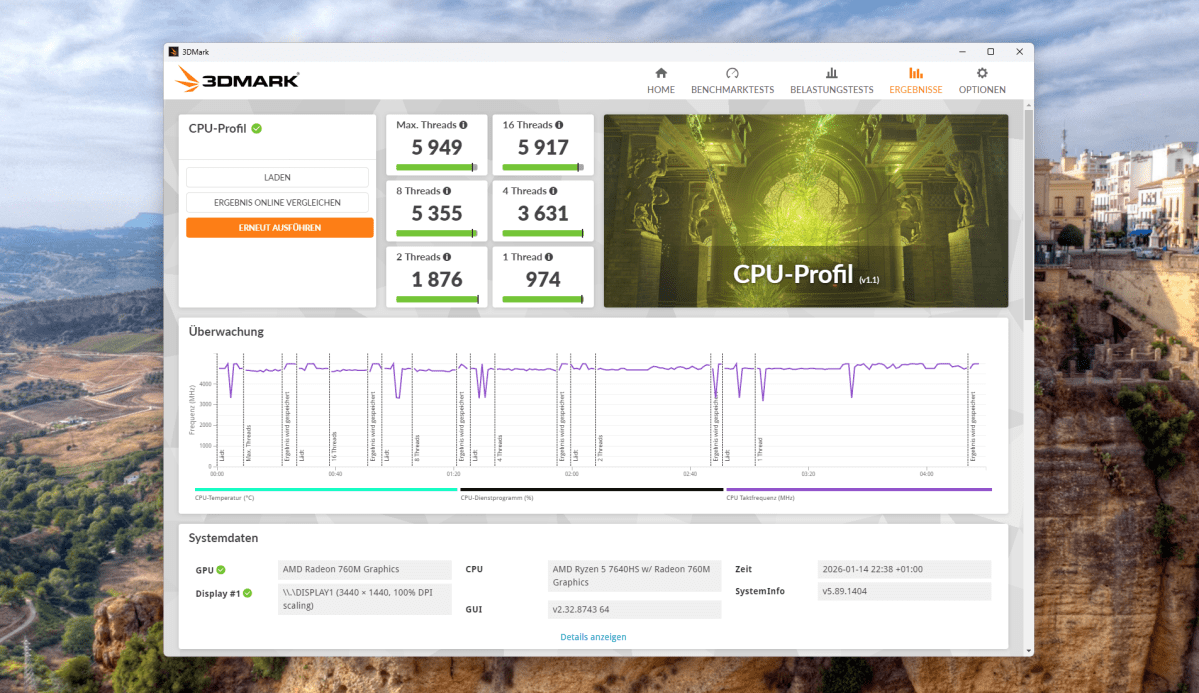
Christoph Hoffmann
With 2,778 points in the Time Spy test, this mini PC achieves impressive performance for its size and marks the current performance peak of classic integrated graphics solutions in the mini PC segment. The Radeon 760M’s 2,488 graphics points show that it outperforms conventional Intel solutions (Iris Xe) by almost 50 percent and enables smooth Full HD gaming.
The 8,202 CPU points are the real highlight: They prove that the Ryzen 5 7640HS, thanks to its Zen 4 architecture, does not throttle even under continuous load and comes close to compact desktop systems.
The result in the Steel Nomad Light test is revealing, as this benchmark was developed for cross-platform systems without a dedicated graphics card. With 2,249 points and an estimated gaming performance of over 30 FPS, the PELADN WO4 proves that it far exceeds the level of simple office computers.
Even if 16.67fps may seem low at first glance in a pure graphics test, this value is good for an integrated solution with very high quality settings. It indicates that current game titles remain playable in Full HD with moderate adjustments to the details. This makes the WO4 an option for casual gamers.
The Geekbench AI Pro values (3,822 single precision / 7,362 quantized) indicate good AI acceleration. This is useful for on-device AI applications, edge computing, and local LLM inference.
In this discipline, the PELADN WO4 is around 10 percent below the Geekom IT15, which is equipped with an Intel Core Ultra 9 285H and an AMD Ryzen AI 9 HX 370, as used in the Sapphire Edge AI 370, for example.
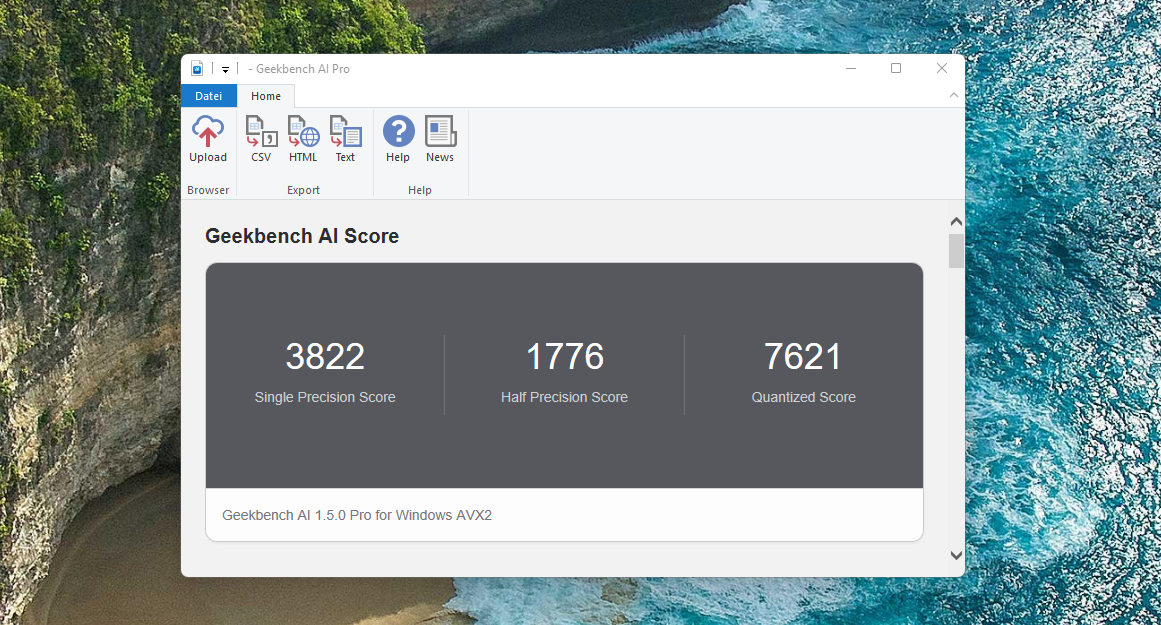
Christoph Hoffmann
The SSD performance in Crystal Disk Mark is good, but not above average: With 5,200MB/s read and 4,733MB/s write speeds, the SSD performs at a decent but not above-average pace. Some higher-priced competitor models achieve read speeds of 6,000 to 7,000MB/s. The SSD speed of the WO4 is significantly higher than that of the Alliwava models (GH8 and H90), which are equipped with a slow PCIe 3.0 NVMe.
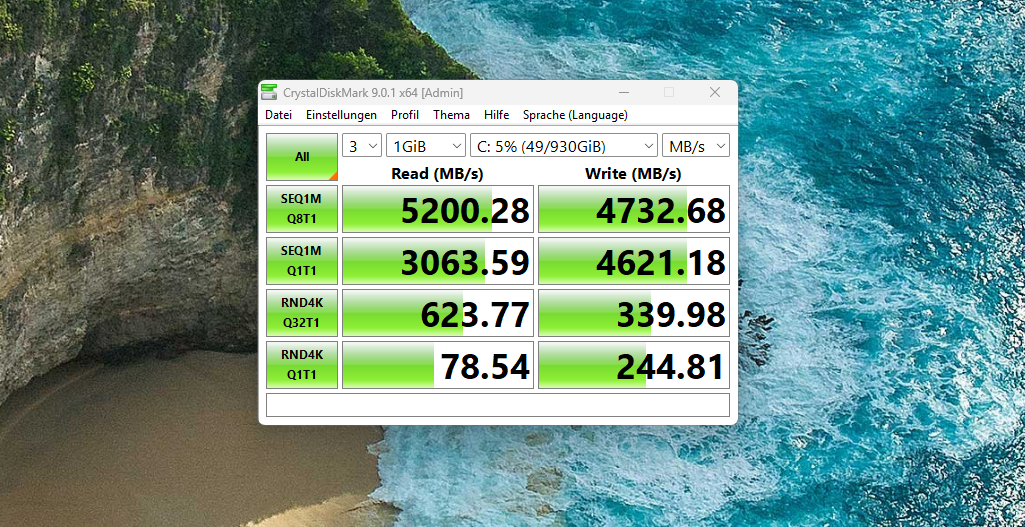
Christoph Hoffmann
Conclusion
Our impression of the PELADN WO4 is positive. In terms of performance, the Ryzen 5 7640HS makes a clear statement. Thanks to the Zen 4 architecture and powerful Radeon 760M graphics, the WO4 closes the gap between office PCs and gaming systems. It masters demanding multitasking scenarios, AI-supported workflows, and even modern gaming in 1080p with flying colors, without reaching its thermal limits. The FrostCool system works so smoothly that the computer is unlikely to be perceived as disruptive, even in quiet working environments.
Its (almost) unique selling point is the clever housing concept with a magnetic cover. Easy, tool-free access to RAM and SSD is user-friendly. This not only makes the system low-maintenance, but also future-proof for later upgrades.
For users looking for a powerful, quiet, and flexible companion for their desk that won’t become electronic waste after just two years, the PELADN WO4 is a smart investment.
Technical specifications
- Processor: AMD Ryzen 5 7640HS (6 cores / 12 threads, up to 5.0 GHz)
- Graphics: AMD Radeon 760M (RDNA 3 architecture)
- Memory: 32 GB DDR5-5600 (2 × 16 GB removable)
- Internal storage: 1 TB NVMe SSD (Crucial P3, PCIe 4.0 x4)
- Connectivity: Wi-Fi 6E, Bluetooth 5.2, 1 × 2.5G Ethernet, 1 × Gigabit Ethernet
- Connections: 1 × HDMI 2.1, 1 × DisplayPort
- 1 × USB-C (full feature), 4 × USB 3.2 Gen 2, 3.5 mm jack
- Cooling: FrostCool dual fan system
- Special feature: Magnetic case cover for tool-free access
- Operating system: Windows 11 Pro pre-installed
- Dimensions: 128 × 128 × 52 mm (width × depth × height)
- Weight: approx. 550 grams
This article originally appeared on our sister publication PC-WELT and was translated and localized from German.
Notepad++ hit by suspected Chinese state-sponsored hackers – here’s what we know so far
Notepad++ targeted and used to deliver poisoned updates to a select group of victims.
Go to Source
Microsoft Teams will now let you shout about how great you are at work
Show off your ‘skills’ with an updated profile on Microsoft Teams
Go to Source
Logitech just revealed a surprisingly affordable gaming headset it says is designed to help you ‘chill anywhere’ — it’s stylish and offers a 24 hour battery life
Logitech has just revealed the new G325 Lightspeed, a wireless gaming headset at a budget price.
Go to Source
Malwarebytes and ChatGPT team up to check all of those suspicious texts, emails, and URLs with one simple phrase
Malwarebytes and ChatGPT are teaming up to provide quick, easy, and free scam checking with just one simple phrase
Go to Source